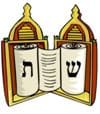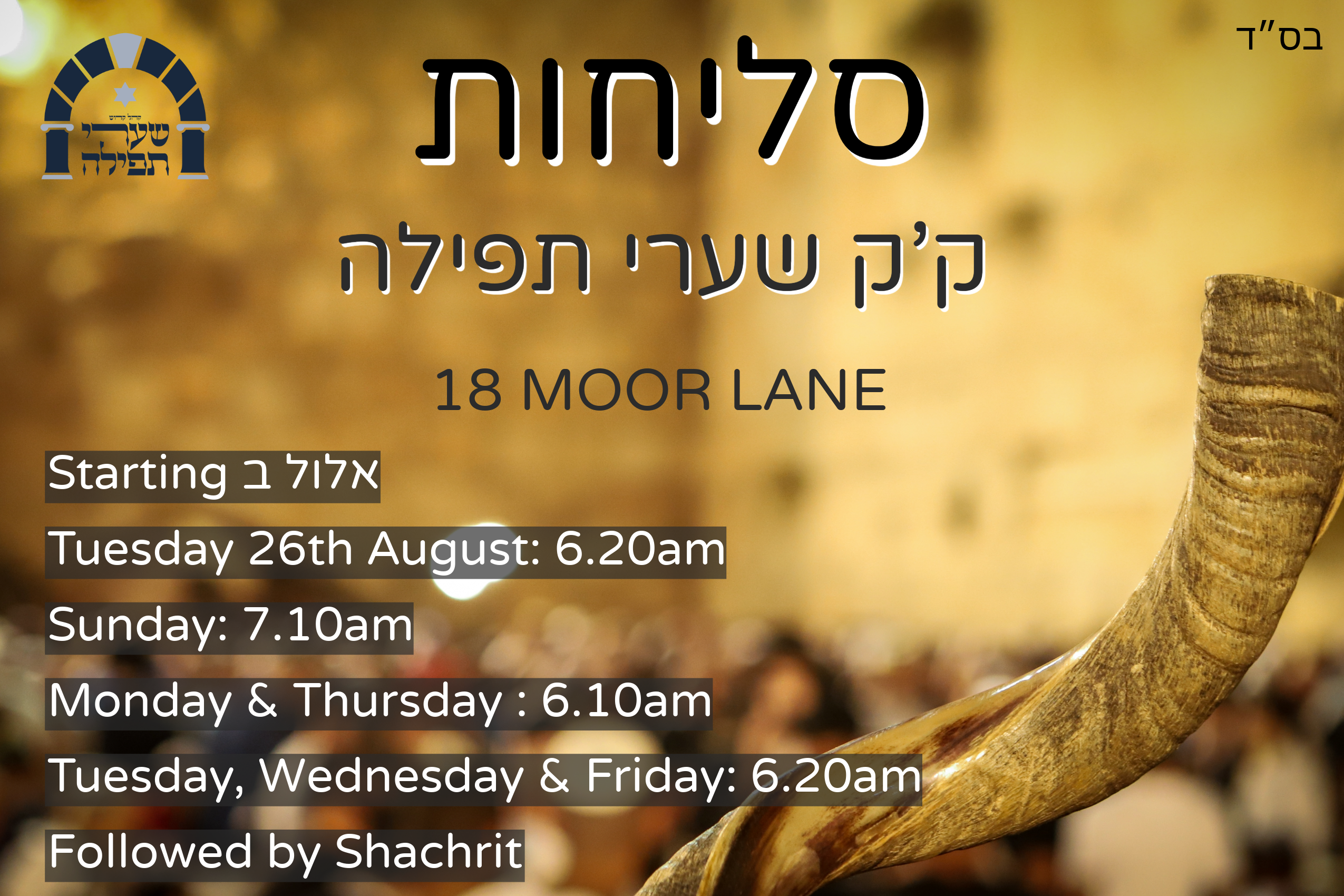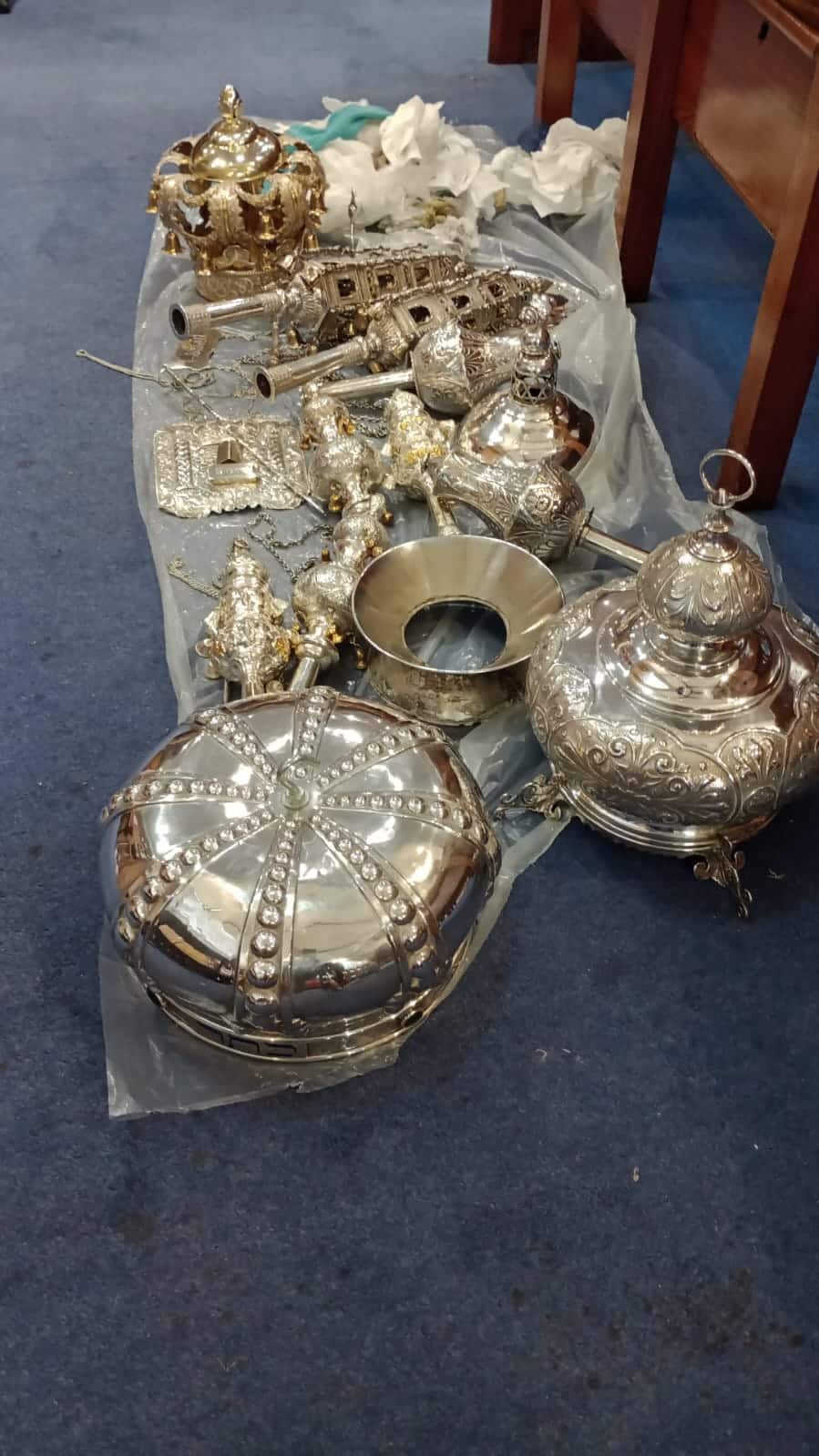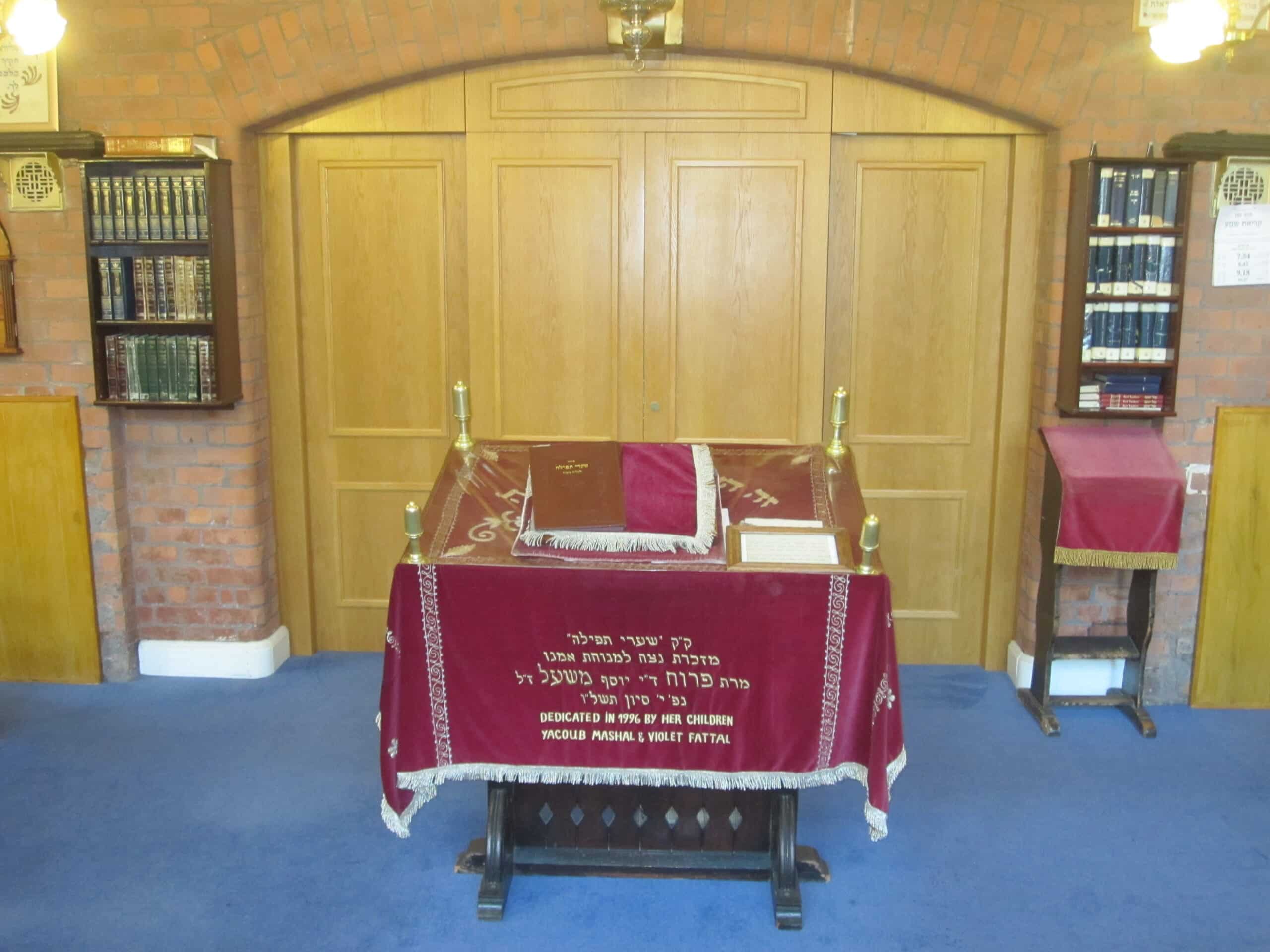



****

****
🍾🥂Mazal Tov🥂🍾
to
David Belilo
on celebrating his wedding to
Rina Miller
Mazel Tov to families Miller & Belilo
****
📝
Please reply to the form below 👇
if you have not already done so
if you would like a seat 💺 reserved for the
Yamim Noraim ✡️
Thank you

Ladies’ Seating Plan for the Yamim Noraim – High Holy Days 5786 – 2025
If your wife does not receive moorlanenews emails, please forward this email to your wife, Thank you
Dear Ladies,
We hope this letter finds you well and in good health.
Baruch Hashem, as we approach another Rosh Hashana & Yom Kippur, we are willing to reserve a seat for LADY MEMEBERS OF OUR COMMUNITY.
We will attempt, to the best of our ability, to allocate the seats according to where the ladies sit throughout the year, but we cannot guarantee how the seats will be assigned. We will also consider accommodating places for unmarried girls over Bat Mitzva to sit next to or close to their mothers.
Please tick for which day(s):
1) Rosh Hashana DAY 1 _______
2) Rosh Hashana DAY 2 _______
3) BOTH DAYS OF ROSH HASHANA _______
4) ONLY Yom Kippur _______
5) BOTH (Rosh Hashana and Yom Kippur) _______
Please let us know below who the seat is for:
1) Name _______________________________
2) Name _______________________________
3) Name _______________________________
4) Name _______________________________
5) Name _______________________________
Please note, we will gladly reserve and allocate you a seat, however, if for example, you are allocated a seat for Yom Kippur but can only come for Ne’ilah please understand that your seat cannot be kept vacant all day, when others could use the seat until you arrive.
Therefore, we endeavour to do the following:
· A clear sign will be posted asking ladies to respect the allocated seating plan by not sitting in someone’s allocated place and to vacate the seat as soon as the lady comes.
· If someone is sitting in your allocated seat when you arrive, you have the right to politely ask that person to move.
· We request that you ask the lady to move in the most polite, discreet and nicest way possible so as not to cause embarrassment, offence or any discomfort whatsoever.
NON-MEMBERS
For non-members, there will be a charge of £25 per seat per day to have an allocated place in the ladies’ gallery.
Alternatively, become a country member for £180 per annum as a family (Full membership is £360 per annum), and this entitles you to free seats for Rosh Hashana & Yom Kippur.
If you want to pray with us but have financial issues then please speak to the treasurer privately, and arrangements can be made. We will NEVER turn you down.
Payments can be made
1) Directly to a member of the executive or Mahamad
2)
Bank | Branch Title (not address) | Sorting Code Number |
Natwest Bank plc
| 463 Bury New Road, Prestwich, Manchester M25 1AB | 01-07-20 |
Beneficiary’s Name | Account Number |
MANCHESTER CONGREGATION OF SPANISH AND PORTUGUESE JEWS | 01012525 |
3) Using the link below
charityextra.com/charity/moorlane
Thanking you in advance.
Tizku leshanim rabot
The Gabbaim
PS – Whilst there is no charge for allocating you a seat, any donations made will be gratefully appreciated.
***

חודש אלול
We are proposing to collaborate with a worldwide initiative over Elul
where we, as a kehilla, work on stopping talking in the Bet Knesset during tefilla and keriat hatorah.
Rabbi Stamler spoke 2 weeks ago about the benefits of such efforts this Shabbat,
and we hope everyone will take part with much, silent, enthusiasm.
The initiative will also generate a sponsor towards our Kiddushim
to help us celebrate this achievement outside of the Bet Hakeneset.
As part of this we will also say the misheberach of the
Tosafot Yom Tov on the Shabbatot in Elul for those who remain silent during tefillah.
This initiative is intended to help preserve the sanctity and respect of the Bet Knesset.
And whilst we already enjoy a respectful environment in our Bet Hakeneset
we would like to work on this strength of ours. May it be a great zechut for us and all AM yisrael.
Chizku VeImtsu
*********
לוח זמני תפלה לקיץ תשפ״ה
Summer Timetable 5785 – 2025
מוצאי שבת | ערבית )מוצ”ש( | שקיעה | סוף זמן קראת שמע | זמן שבת | פלג מנחה (תה״ד) | פלג מנחה (לבוש) | מנחה וקבלת שבת | תאריך | שבת פרשת |
Shabbat Ends | Arbit | Sunset | Shema to be read before | Candles to be |
| Earliest Candle lighting | Minha & Kabbalat Shabbat* | Date | Parasha |
PM | PM | PM | AM | PM | PM | PM | PM |
|
|
8:19 | 8:15 | 7:28 | 9:51 | 7:16 | 6:42 | 6:12 | 7:16 | 12/13 Sep | כי תבא |
🕯️SUMMER TIMES FOR SHABBAT 🕯️
שבת
קרבנות
9:00 am
הודו
9:15 am
מנחה
6:30 pm
********
When the Jewish Peopledwell in the Land of Israel, its first fruits are to be taken to the Temple and given to the kohen. This is done in a ceremony that expresses recognition that it is G-d who guides the history of the Jewish People throughout all ages. This passage forms one of the central parts of the Pesach Haggadah that we read at the Seder.
On the last day of Pesach of the fourth and seventh years of the seven-year shemitta cycle, a person must recite a disclosure stating that he has indeed distributed the tithes to the appropriate people in the prescribed manner. With this mitzvah Moshe concludes the commandments that Hashem has told him to give to the Jewish People. Moshe exhorts them to walk in Hashem’s ways because they are set aside as a treasured people to Him.
When the Jewish Peoplecross the Jordan River they are to make a new commitment to the Torah. Huge stones are to be erected and the Torah is to be written on them in the world's seventy primary languages, after which they are to be covered over with a thin layer of plaster. Half the tribes are to stand on Mount Gerizim, and half on Mount Eval, and the levi'im will stand in a valley between the two mountains. The levi'im will recite twelve commandments, and all the people will answer “amen” to the blessings and the curses. Moshe then details the blessings that will be bestowed upon the Jewish People, blessings that are both physical and spiritual. However, if the Jewish People do not keep the Torah, Moshe details a chilling picture of destruction, resulting in exile and wandering among the nations.

אל תעש תפילתך קבע
הנה בימים אלו שהם ימי הרחמים והסליחות, מחוייב כל אדם לפשפש במעשיו לשוב אל קונו. ומכלל ההתחזקות המוטלת על רוב בני אדם, היא בענין עבודת התפילה, שתהיה כראוי, שישמע ה' את תפילתינו להשיבנו אליו, לקבל את תשובתינו, ושיחדש עלינו שנה טובה ומבורכת.
ובגמרא במסכת מועד קטן (כח.) אמרו, בני חיי ומזוני (בנים, חיים, ומזונות, כלומר פרנסה), לא בזכותא תליא מלתא, אלא במזלא תליא מלתא. כלומר, יתכן אדם שהוא עובד את ה' כראוי, ואף על פי כן יהיה עני, או שלא יהיו לו בנים, או שלא יזכה לאריכות ימים. וזאת משום שמזלו של אותו אדם כך הוא, שלא יהיו לו בנים, וכן על זה הדרך.
ולכאורה מבואר שלא יועילו התפילות לאדם בענינים אלו, משום שאם מזלו של אותו אדם מטבע ברייתו כך הוא שיהיה עני, מה תועיל התפילה לשנות את רוע מזלו.
אולם מרן רבינו עובדיה יוסף זצ”ל, כתב בזה, דמכל מקום על ידי תפילה אין ספק שיוכל אדם לשנות הכל, אפילו את מזלו. וסמך לדבר מן הפסוקים, “ועבדתם את ה' אלהיכם”, זו תפילה. (כמו שאמרו בתענית ב. איזו היא עבודה שבלב, זו תפילה), ואחר כך נאמר, “ובירך את לחמך ואת מימיך”, אלו מזונות, “לא תהיה משכלה ועקרה בארצך”, אלו בנים, “את מספר ימיך אמלא”, הרי אריכות ימים. ואם כן על ידי תפילה יוכל אדם לשנות את רוע מזלו.
אולם זאת בתנאי, שתהיה התפילה בכוונה מלאה. ובפרט תפילה שאחרי לימוד תורה, וכמו שכתוב בזהר הקדוש (פרשת פנחס), ואלו דבריו: בא וראה, כל הבריות שבעולם לפני שנתנה התורה, היו תלויים במזל, ובכלל זה בני חיי ומזוני, אבל אחר שניתנה תורה לעם ישראל, הוציאם ה' משלטון הכוכבים והמזלות, וזאת למדנו מאברהם אבינו, שראה במזלו שעתיד שלא יהיו לו בנים, והקדוש ברוך הוא אמר לו, צא מאיצטגנינות שלך, כלומר, אל תתייחס לדברים אלו, כי על ידי תורה ותפילה משתנה מזלו הרע של האדם.
והנה מלבד ענין הכוונה בתפלה, צריך שתהיה התפילה בלב נשבר, וכמו שנאמר, לב נשבר ונדכא, אלהים לא תבזה. כי הקדוש ברוך הוא שומע ביותר תפלת הנאנקים ומתפללים בכל לבם לפניו. ואמרו רבותינו, אפילו כל השערים ננעלו, שערי דמעה לא ננעלו. ואם לא יוכל אדם לבכות בתפלתו מאיזו סיבה, כתב מרן החיד”א, שיוכל על כל פנים להתפלל בלב נשבר בקול בכי, שגם בתפלה כזו יש מעלה קרובה לתפלה בדמעות ממש. וכן היה מרן זצ”ל רגיל להוסיף על זה, שהתפלה בקול בכי נשמעת לפני ה' יתברך אפילו בלי שיבכה האדם בדמעות ממש, כמו שנאמר “כִּי שָׁמַע ה' קוֹל בִּכְיִי”.
וידע כל אדם, כי כל מה שיוכל לעשות ולפעול בכל מיני השתדלות שבעולם, כל זה אינו שוה כנגד תפלות הבאות מעומק הלב. ובעיננו ראינו, יהודי יקר מעיר תל אביב, שהיה דר בשכונה מלאה בכל מיני תאוות העולם, וכל ילדיהם של שכניו, שהיו מהם יהודים יראי שמים, יצאו לתרבות רעה, משום שלא עמדו בנסיונות המצויים בשכונתם. מה עשה אותו יהודי? היה מתפלל לפני ה' יתברך בדמעות שליש, יום יום, עוד מזמן שילדיו היו רכים מאד בשנים, וזכה שבאמת נתקבלו תפילותיו, וכל בניו יצאו למודי ה', תלמידי חכמים ממש, ובנותיו זכו אף הן לצאת צנועות וחכמניות, ונישאו לתלמידי חכמים, והקימו דור ישרים מבורך. ותמיד אומר אותו יהודי לכל שואליו, כי אין לו ספק בדבר, כי ילדיו יצאו מוצלחים, אך ורק בזכות הדבר הזה, שלא התעצל בתפילותיו, ועוד מזמן שהסכנה לא היתה נראית באופק, כי היו ילדיו קטנים, היה מתחנן ומתפלל כל יום בערגה ובחשק רב, שיזכהו ה' יתברך לרוות נחת מילדיו, שיהיו כולם יראי שמים. ישמע החכם ויוסיף לקח.
Do Not Make Your Prayer a Burden
During this period of mercy and forgiveness, one is obligated to examine one’s deeds and return to one’s Creator. Included in the service of Hashem that one must strengthen during these days is in the area of prayer. One should pray properly so that Hashem accepts our prayers to return us to Him, accept our repentance, and grant us a good and blessed new year.
The Gemara in Masechet Mo’ed Katan (28a) states: “Children, life, and sustenance do not depend on merit; rather, they depend on fortune.” This means that it is possible that one serves Hashem properly yet he may be poor, not have children, or not merit living a long life. This is because the fortune of this individual dictates that he will not have children and the like.
It seems from this Gemara that one’s prayers will not help in these areas, for they are contingent on one’s fortune and if the very nature of one’s creation dictates that he shall be poor, how can one’s prayer annul this Heavenly decree?
Nevertheless, Maran Rabbeinu Ovadia Yosef zt”l writes that through prayer one can certainly change everything, even one’s fortune. A source for this can be found in the verse, “You shall serve Hashem, your G-d” which refers to prayer (as the Gemara in Masechet Ta’anit, 2a, tells us that “service of the heart” refers to prayer). Following this verse, another verse states, “And He shall bless your bread and your water” which refers to sustenance, “there shall be no miscarrying or barren woman in your land” which refers to children, and “I shall fill the number of your days” which refers to life. Thus, one can clearly change any harsh decree hovering over one’s self through prayer.
However, this only applies when one prays with complete concentration, especially when praying after learning Torah. Indeed, the holy Zohar (Parashat Pinchas) states: “All of the world’s creations depended on fortune before the Torah was given, including the areas of children, life, and sustenance. However, once the Torah was given to the Jewish nation, Hashem removed them from the control of the stars and constellations. We have learned this from Avraham Avinu who saw that his fortune dictated that he will not have children and Hashem told him, ‘Leave your astrology (fortune).’” This means that one should not pay attention to such things, for through Torah study and prayer, one’s fortune can change.
Besides for praying with concentration, one must likewise pray with a broken heart, as the verse states, “A broken and downtrodden heart, G-d, You shall not turn away.” Hashem hears the prayers of those groaning before Him and praying to Him with all their hearts the most. Our Sages have said, “Even if all other gates have been sealed, the gates of tears have not.” If, for whatever reason, one cannot cry while he is praying, Maran Ha’Chida writes that that one should pray with a broken tune as if one is crying, for this kind of prayer is on a high level and is considered almost like actually crying. Maran zt”l added that praying in a broken and wailing tune is especially accepted by Hashem, as the verse states, “For Hashem has heard the sound of my wailing.”
One must know that whatever kind of physical or material effort one puts forth on this earth keels in comparison to prayers that emerge from the depths of one’s heart. We have seen with our own eyes a fine Jew residing in Tel Aviv in a location full of the most immoral things in the world whose neighbors’ children all left the path of the Torah as they could not stand firm against the trials of the neighborhood. This Jew, however, prayed to Hashem every day and shed copious tears while his children were still young and innocent and he indeed merited that all of his son’s emerged unscathed and became tremendous Torah scholars and his daughters merited emerging modest, pure, and all married to Torah scholars. This fine Jew always tells those who ask him that his children emerged the way they did because he was relentless with his prayers and even when his children were still young and the danger did not seem to lurk in the distance, he would plead before Hashem longingly that Hashem indeed let him merit attaining satisfaction from his children. This is indeed what ended up happening.